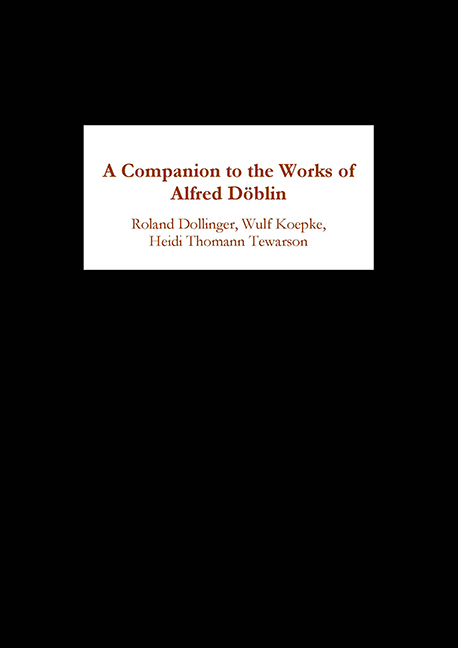Book contents
- Frontmatter
- Contents
- Foreword
- Abbreviations and Translations of Titles
- Works by Alfred Döblin
- Introduction
- Early Works
- Works of the Weimar Period
- Exile and Return to Europe
- Döblin, the Critic of Western Civilization: The Amazon Trilogy
- Döblin's November 1918
- Döblin and Judaism
- Robinson the Castaway: Döblin's Christian Faith as Reflected in His Autobiography Schicksalsreise and His Religious Dialogues Der unsterbliche Mensch and Der Kampf mit dem Engel
- The Tragedy of Truth: Döblin's Novel Hamlet oder Die lange Nacht nimmt ein Ende
- Bibliography
- Notes on the Contributors
- Index
Döblin, the Critic of Western Civilization: The Amazon Trilogy
from Exile and Return to Europe
Published online by Cambridge University Press: 27 April 2017
- Frontmatter
- Contents
- Foreword
- Abbreviations and Translations of Titles
- Works by Alfred Döblin
- Introduction
- Early Works
- Works of the Weimar Period
- Exile and Return to Europe
- Döblin, the Critic of Western Civilization: The Amazon Trilogy
- Döblin's November 1918
- Döblin and Judaism
- Robinson the Castaway: Döblin's Christian Faith as Reflected in His Autobiography Schicksalsreise and His Religious Dialogues Der unsterbliche Mensch and Der Kampf mit dem Engel
- The Tragedy of Truth: Döblin's Novel Hamlet oder Die lange Nacht nimmt ein Ende
- Bibliography
- Notes on the Contributors
- Index
Summary
In an autobiographical text titled “Epilog” (SLW, 304–21), written and published in 1948, Döblin comments extensively on the genesis of his tripartite novel now commonly known as the Amazon trilogy. The author remembers the days he spent in the Bibliothèque Nationale in Paris during the mid-1930s looking at maps of South America and studying the historical accounts of this southern portion of the Western Hemisphere. The reader cannot overlook the spontaneity with which the author approached his subject; he had hardly any prior knowledge, but soon began asking some serious questions.
Eines zog das andere nach sich. Ich las von den indianischen Ureinwohnern, stieg in ihre Geschichte und las, wie die Weißen hier eindrangen. Wo war ich hingeraten? Wieder das alte Lied, hymnische Feier der Natur, Preis der Wunder und Herrlichkeiten dieser Welt? Also wieder eine Sackgasse? (SLW, 315)
While phrases like “Wieder das alte Lied?” and “wieder eine Sackgasse?” recall some of Döblin's earlier works, such as Berge Meere und Giganten, which had received little more than “eine Art Achtungserfolg” (SLW, 311), the passage as a whole seems to question the author's achievements at a time when he was living with his family in exile in France, and the world he knew was threatened by political usurpers in Germany. Döblin added several more paragraphs to the passage above in order to justify not only his choice of a topic that was both geographically and historically remote — and thus might appear as an escape from reality — but also to state its social and political relevance. By mentioning the missionary Bishop Las Casas, who during the final chapters of the first part of the trilogy emerges as a positive counterforce to the murderous and greedy European conquerors of South America, and by calling the entire first book a “Vorspiel” to what still was to come, the author stresses the structural significance of the last two books and the thematic unity of the entire opus. Döblin summarizes the three parts as an attempt to fulfill three goals: (1) “diesem Flußmeer zu geben, was des Flußmeeres war, auch die Menschen zu zeichnen, und die Weißen nicht aufkommen zu lassen,” (2) to portray “den großen Menschheitsversuch, die Jesuitenrepublik am Paraná,” and (3) “die furchtbare, trostlose, brütende Verlorenheit, die nachbleibt, zu zeichnen” (SLW, 315–16).
- Type
- Chapter
- Information
- A Companion to the Works of Alfred Döblin , pp. 193 - 214Publisher: Boydell & BrewerPrint publication year: 2003



